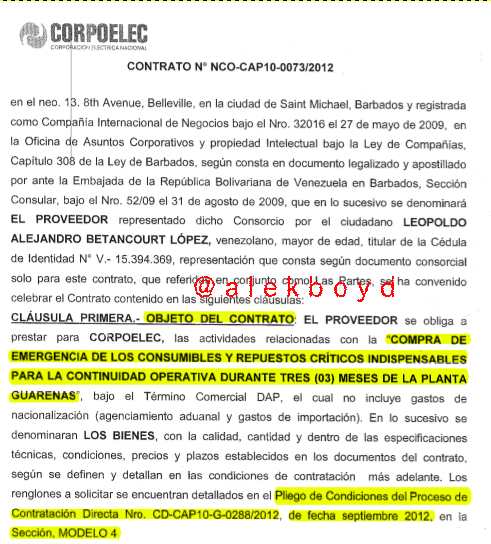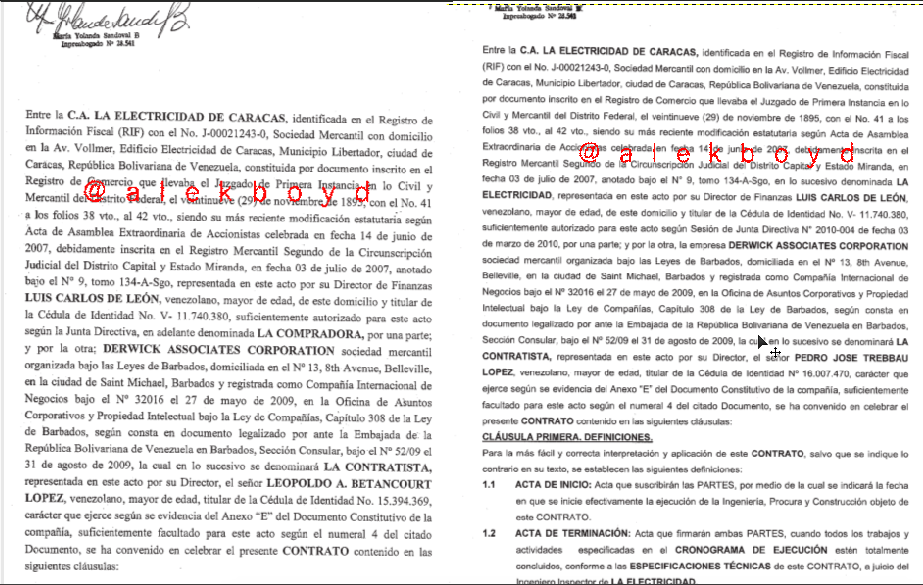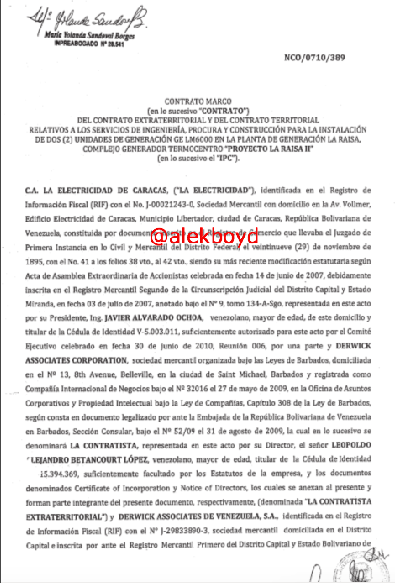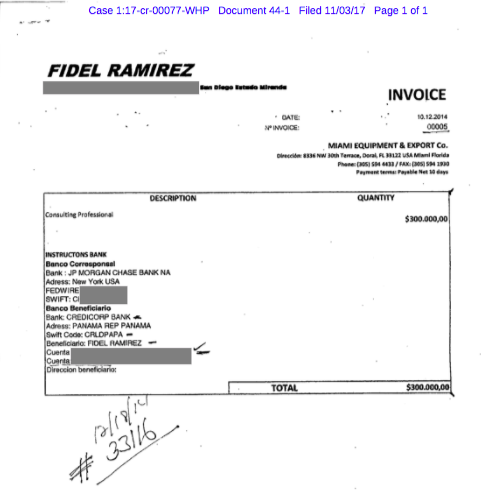The Wall Street Journal was the first to report, in August 2014, on prosecutors from the Southern District of New York probing Venezuela's rampant corruption. The report followed a visit to Caracas of WSJ reporters, in July 2014, seeking further information on Derwick Associates, a company headed by Alejandro Betancourt (aka Leopoldo Alejandro Betancourt Lopez) that by 2014 had been granted 12 no-bid procurement contracts, by Petroleos de Venezuela (PDVSA) and other public institutions (BARIVEN, CORPOELEC, CVG), worth well over one billion USD.

Late Hugo Chavez declared a nationwide power emergency in 2009, after which three companies (Derwick Associates, OVARB and KCT) were contracted to solve the issue. Wall Street Journal reporters asked Derwick executives, as well as their PR and legal counsel, very specific questions about the manner in which the contracts had been awarded. Derwick has maintained, since Cesar Batiz first broke news about Derwick-associated corruption in 2011, that it had participated in some 25 bidding processes, winning about half of them. Batiz, at the time an investigative journalist with Ultimas Noticias, could not find official evidence of alleged bid calls anywhere. Batiz made information requests to Derwick, and to all institutions involved. Batiz introduce a FOIA of sorts with PDVSA, and personally confronted then PDVSA CEO Rafael Ramirez demanding details about procurement contracts granted to Derwick et al. Batiz also filed a formal probe request with Venezuela's Attorney General Office and Supreme Court. As shown above, Derwick was contracted through "Contratación Directa", which means no-bidding process involved.
Needless to say that Batiz efforts were pointless, as far as Venezuelan authorities and Derwick were concerned. American authorities, however, took a different view. Given the manner in which most of these procurement contracts were carried out, Derwick for instance subcontracted all the work to Missouri's Pro Energy Services and sourced all turbines to EPS (a Pro Energy Services subsidiary), a number of FCPA aspects came into play. A Missouri firm, selling well over one billion USD worth of services and equipment to Venezuela, raised the alarm.

Pro Energy Services sources revealed that the FBI, Treasury and Homeland were looking into the company's affairs in 2012 regarding offshore tax evasion. Prosecutors from the Southern District of New York were given a large cache of Pro Energy Services data that was first offered to this website in November 2013. Fusion GPS was present in the meeting in Caracas between WSJ reporters and Derwick. Lewis Baach's Adam Kaufmann was also there. Their intention to silence further reporting from the WSJ was a resounding success, with Kaufmann even going on record stating "we are a transparent company and have nothing to hide."
Preet Bharara from the Southern District of New York reignited the probe in 2016, by requesting from Swiss authorities information related to PDVSA's bank accounts, specifically about dealings between PDVSA and OVARB, one of the three companies exposed by Batiz. Bharara's request was part of a probe into a bribe payment scheme OVARB was involved in with PDVSA, which resulted in OVARB receiving over one billion USD worth of contracts. Roberto Rincón, OVARB's CEO, was subsequently indicted and pleaded guilty.
But Bharara's request to Swiss Federal Office of Justice was not limited to just Rincon, Derwick was also of interest. Sources in Switzerland then reported that judicial authorities in that country were looking into Derwick's affairs. Derwick's lawyers appear to be fighting Swiss authorities' disposition to share with US Department of Justice (DoJ) banking information related to PDVSA deals with the company.
Two weeks ago Nervis Villalobos, a former Vice Minister and Rafael Ramirez's trusted person, was arrested in Spain on a DoJ warrant request. Three other people were arrested: Rafael Reiter (PDVSA / Ramirez's head of security), Cesar Rincon Godoy (PDVSA / BARIVEN) and Luis Carlos de Leon (CORPOELEC official).


Nervis Villalobos was instrumental in getting Derwick contracts. Alvarado and de León have signed contracts with Derwick's Alejandro Betancourt and with Pedro Trebbau while working for CORPOELEC, as seen above. Villalobos goes back a long time with Rafael Ramirez and with Javier Alvarado Ochoa, another corrupt official wanted by DoJ. Media reports on the arrests in Spain have been misleading. Villalobos was not a fundamental part of Rincon's bribery payment scheme, but that of Derwick. As reported by Batiz, Villalobos was a regular passenger in Derwick's private jet, and cut many deals for them. Villalobos was equally important in another money laundering scheme, through which 4.2 billion USD were syphoned out of PDVSA with Ramirez' complicity.
I am, easily, the person who has researched and written more about Venezuelan corruption in general, and Derwick Associates in particular. It continues to puzzle me, how FCPA violations and money laundering of a Texas company resulted in indictments and criminal charges against Rincon, but same about a Missouri company did not against Betancourt, Trebbau et al, whose involvement in corruption dwarfs that of Rincon. But then, in a separate money laundering case brought by Southern District of New York prosecutors (United States v. Luis Diaz, Jr., et al), Fidel Ramirez, Rafael Ramirez's brother, has been named as one of a few individuals participating in a money laundering scheme through a company called Miami Equipment and Export Co. In documents presented by prosecutors on 3rd November, Fidel Ramirez is exposed as having received a $300,000 bribe from KCT (see below), the second of the three companies denounced originally by Batiz. Ergo, of three companies that got power contracts thanks to Ramirez's nepotism, two have either pleaded guilty (OVARB) or have been shown to be corrupt (KCT). Ramirez's trusted man (Villalobos) sits in a Spanish jail. Ramirez's brother, a medic without track record in energy, now exposed as a conduit in a money laundering and bribery scheme.

Derwick has admitted that it paid bribes ("consulting fees") to obtain contracts in Venezuela. There's even a voice recording of that admission somewhere. Venezuela's new prosecutor, previous one didn't see corruption in over ten years in office, is allegedly investigating "spectacular overpricing" involving Derwick. That's mere posturing for the gallery, of course. But then a Derwick representative (Fusion GPS perhaps?) told the WSJ the DOJ had been looking into their bank accounts, therefore DoJ is already privy to some of Derwick's financial records.
Sources have revealed to this site that Adam Kaufmann (Derwick's legal counsel) and Francisco Convit (one of Derwick's main characters) are collaborating with US authorities. That may explain the DoJ's lack of action against Derwick. They may have been offered a deal, in exchange for ratting Ramirez et al.
Of all the thugs involved in this saga, Derwick are, by far, the more "international". Derwick is into energy with GAZPROM, is into banking in Switzerland (Banca Credinvest), is into fashion (with Spanish folks that have no qualms in assisting with money laundering), they have a hedge fund of sorts in Luxembourg used for investments in Africa, they're in the parallel black market in Venezuela, they have Venezuelan officials and opposition under control while falsely claiming to be 'training future generation of Venezuelan engineers', they have retained the "very best" of American PR and legal "services". Given the size and level of network in which they operate, Derwick's downfall could be extremely damaging to Venezuelan, Russian, American, French, Swiss, and Spanish interests.
The part of the world's media that has any interest in large scale corruption is, obviously, entertained with the latest leak (ParadisePapers). It is not an exaggeration to say that Ramirez has the keys to the world's largest corruption scandal in the last few years. Ramirez was, for over a decade and simultaneously, Venezuela's Minister of Energy and CEO of PDVSA. The size of budgets under his, almost unrestricted, control easily exceed all other corruption cases reported to date combined. To give an idea: just between 2012 and 2015 PDVSA awarded over 30 billion USD worth of contracts, and some of the recipients weren't even properly registered. In a joint investigation between Venezuelan Congress Audit Committee and this website, it was determined that at least 6 billion USD went to fake, non-existent companies in the period.
And yet, Ramirez's brother involvement in a money laundering scheme, which is just a tiny window into an exponentially larger hole, has gone completely unnoticed. It is understandable that Venezuelan media aren't reporting this. My websites, a possible source of unreported-by-mainstream-media stuff have been censored in Venezuela since 2014. But the WSJ? Not even a follow up on own story?
Ramirez won't be able to claim diplomatic immunity to escape possible charges in the US, for his involvement predates his appointment as Venezuela's Ambassador to the UN. His brother, who was one of Hugo Chavez's personal doctors, is safe and happy in Venezuela where he has nothing to fear. Javier Alvarado, who is on the run, must be desperately trying to make his way back to Venezuela, while Villalobos, Reiter, de Leon & co must already be spilling the beans. Derwick's execs seem to be perfectly fine living in Spain. It would be truly sad to learn that the DoJ has cut a deal with Derwick, after what they've done and what they've stolen. Not a price worth paying, even with Ramirez as a prize. Estimates put close to one billion USD amount misappropriated by Derwick in overcharges. That's just one of PDVSA's many corrupt deals that took place under Ramirez's watch.

